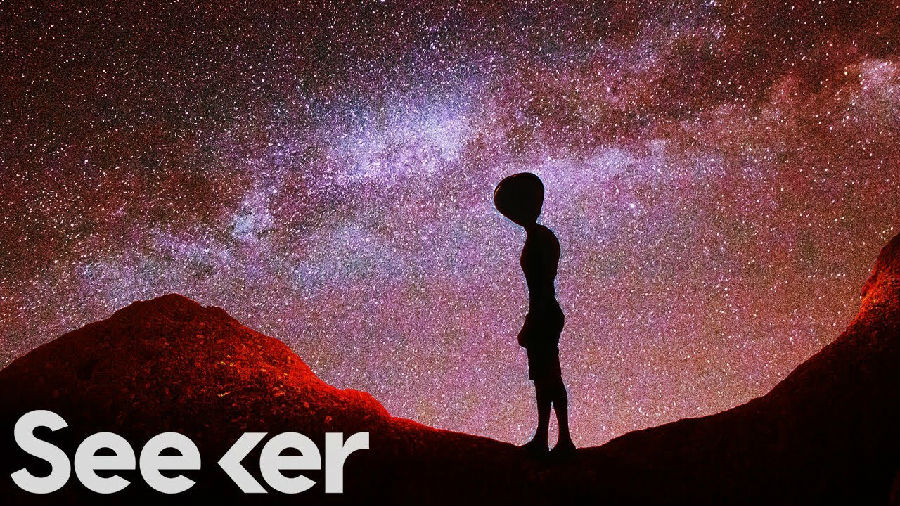As my favorite comic strip artist once said,
正如我最喜欢的漫画艺术家曾经说过的那样,
"The surest sign that intelligent life exists elsewhere in the universe is that is none of it has tried to contact us."
“宇宙中其他地方存在智慧生命的最可靠迹象就是它们都没有试图联系过我们。”
But as it turns out, we earthlings may be luckier than we previously thought.
但事实证明,我们地球人可能比我们想象的幸运。
Scientists have new evidence that one element in particular may be essential to creating life,
科学家们找到了新的证据,证明某一个要素可能对创造生命至关重要,
and that it could be pretty scarce in the rest of the universe.
而且这一要素可能在地球之外的其他地方非常稀少。
So, are we really all alone out here on our blue dot?
那我们真的就是宇宙中孤零零地居住在地球这个蓝色的小点上的生灵了吗?
There are a handful of chemical elements that are the primary building blocks of most life on Earth,
有几种化学元素构成了地球上大多数生命体的主要组成部分,
and some of the big ones are oxygen, carbon, hydrogen, and nitrogen.
其中就包括氧元素、碳元素、氢元素和氮元素。
Those four are a few of the so-called ‘bulk’ elements
这四种元素都属于所谓的“主量元素”,
that make up our muscles and organs and that we need to consume a lot of to stay alive.
我们的肌肉和器官都是由主量元素构成的,而且,要维持生命,我们也必须大量摄入主量元素。
(You may have noticed that breathing is pretty important).
(您可能已经注意到了,呼吸是非常重要的一个途径)。
But the another element, phosphorus, also has an essential task:
但另一个元素,磷元素,也肩负着重要的任务:
it’s the key additional piece that makes up our DNA and RNA
它是构成我们的DNA和RNA的关键附加元素。
(our genetic makeup inside which the rest of our existence is encoded)
(也就是我们的遗传构成,我们能够存在所需的其余信息都是在DNA和RNA上完成编码的)
and our ATP, which is how we store and use energy.
我们的ATP(三磷酸腺苷)里也有磷元素,而ATP是我们储存和使用能源的方式。
It’s like if you were a book,
就好像你是一本书,
being written by hand by a monk who’s looking at instructions in another book.
是一个僧人照着另一本书的写出来的一本书。
Without phosphorus, not only is there no instruction book, but there’s no monk.
没有磷,就没有说明书,也没有僧侣。
And all the pages are on the floor.
所有的书页就都会散落在地上。
Maybe this wasn’t the best metaphor.
这个比方打的好像不是很好哈。
So. Phosphorus is necessary to create and sustain almost all life as we know it.
所以。正如我们所知,磷是创造和维持几乎所有生命都必需的元素。
But hold on--let’s back up.
但等一下 - 我们先倒回去一点儿。
How is it that Earth has these essential elements in the first place?
地球上的这些基本元素一开始是怎么来的呢?
Before the Big Bang, there was nothing.
在大爆炸之前,世界上什么都没有。
Then the Big Bang, and there was A LOT of really hot something,
大爆炸发生后出现了大量高温高热的事物,
mostly super-light elements like hydrogen and helium,
主要是氢和氦这类超轻元素,
which together make up 99% of the matter in the universe .
正是这些元素构成了宇宙中99%的物质。
NASA scientists have determined that the other life-giving elements
美国宇航局的科学家已经确定,其他能够构成生命体的元素
are created inside the core of stars that then become supernovae,
都是在之后会变成超新星的恒星的内核里形成的,
which is when massive, dying stars explode and eject their mass out into the universe in a catastrophic eruption,
当巨大的,垂死的恒星爆发并在剧烈的喷发中将它们的质量喷射到宇宙中时,

spitting out all kinds of stuff including the heavier elements needed for life.
变成各种物质,包括生命所需的质量较重的元素,这就是超新星的来历。
Scientists think that meteorites carrying phosphorus came from a nearby exploding star and plonked down onto Earth
科学家认为地球附近的一颗恒星爆炸后,携带有磷的陨石掠过地球
at just the right time to get included in making Earth’s “proto-biomolecules”,
在恰当的时间直接被纳入了制造地球的“原生物分子”,
or the precursors to what we now recognize as the basic molecules that make up our living systems.
或者成了我们现在认为是组成我们生命系统的基本分子的前身。
The thing is, new evidence indicates that phosphorus-creating supernovae may be kinda rare.
问题是,新的证据表明,能够产生磷的超新星可能还不多见。
Researchers observing the Crab Nebula, which is the remnant of a supernova so big and so bright
研究人员观察蟹状星云,也就是超新星留下的巨大而明亮的星云
it was first noticed by us Earth-dwellers in the year 1054,
早在1054年就有人类观察到这种星云了,
have found that it contains much less phosphorus than our models have predicted.
研究人员发现这种星云磷元素的含量比我们的模型预测的少得多。
Using telescopes to observe infrared light readings from the phosphorus and iron traces in the Crab Nebula,
使用望远镜观察蟹状星云中磷和铁痕迹的红外光读数,
researchers compared it to a previously studied supernova remnant, Cassiopeia A.
研究人员将其与之前研究的超新星遗迹仙后座A进行了比较。
The Crab Nebula phosphorous readings are far lower than those for Cass A, suggesting that supernovae contents could vary dramatically.
蟹状星云的磷的量远低于仙后座A,这表明不同超新星的成分可能会发生巨大变化。
This means that even if a planet has habitable qualities similar to Earth’s,
这就意味着,即使行星具有与地球类似的可居住特性,
they may not be near a supernova, and even if they are,
它们可能也不在超新星附近,即使它们在超新星附近,
that supernova may be spitting out different elements than the ones we were touched by,
超新星喷出的元素也不一定就是我们得到的那些,
meaning life like ours may be even more uncommon than we thought.
意味着我们这样的生命体可能比我们想象的更为罕见。
And we’ve always thought we were pretty darn lucky.
而且我们一直认为我们是特喵的太幸运了。
But I mean, what about other kinds of life?
但我的意思是,其他形式的生命呢?
What if there’s life out there that uses the elements we know of in vastly different ways
如果宇宙中还有生命体,只不过他们需要的元素和我们的认知大相径庭,
and doesn’t need DNA because it’s a life structure we can’t even comprehend?
因为它们是我们无法理解的生命结构,所以根本不需要DNA呢?
Or if there are elements we haven’t even discovered out there in the universe
又或者,宇宙中存在我们还没有发现
creating life that we have no idea how to picture?
但创造了我们还不知道要怎么描述的生命的元素呢?
There’s no scientific evidence for this, at all, but I’m just saying, it’s cool to think about.
这方面还没有任何的科学依据,但我只是想说,想想都很酷不是吗?
Thanks for tuning in and don’t forget to subscribe to Seeker for more SPACE.
感谢您的收看,不要忘记订阅我们的频道《科学探索之旅》获取更多关于宇宙的视频喔。
Check out this video about sending a submarine to Titan,
大家也不妨看看这个关于向泰坦发送潜艇的视频,
and fun fact, the neutron star (or ex-supernova) at the center of the Crab Nebula is as massive as our Sun, but is only the size of a small town.
一个有趣的事实就是,蟹状星云中心的中子星(或前超新星)的质量有太阳那么大,但其大小只有一个小镇那么大。
That’s so dense that a single teaspoon would weigh a billion tons.
其质量是如此密集,以至于一茶匙就重达十亿吨。
I’m Maren, thanks for watching Seeker.
我是Maren,感谢大家收看《科学探索之旅》。












